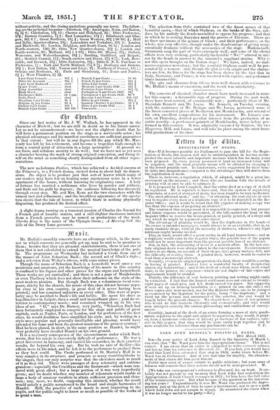31 - toot T.
•
Mr. Hullah's monthly concerts have an advantage which, in the man- ner in which concerts are generally got up, may be said to be peculiar to them; besides that they are pleasant entertainments, there is not one of• them that is not calculated to extend the musical knowledge of the pub- lic. The programme on Wednesday last included a Credo from one of the masses of John Sebastian Bach; the second act of Gluck's Orfeo ; and a selection from Weber's Oberon, with some minor pieces.
Though the name of Sebastian Bach is a household word amorg our musicians and amateurs, yet the knowledge of his music in this country is confined to his fugues and other pieces for the organ and harpsichord. These works are yet unrivalled ; and there is not a page of Mendelssohn or even Thalberg which does not show their influence on the style of the most modern pianists. But though Bach was a voluminous vocal com- poser, chiefly for the church, his music of this class did not become popu- lar even in his own country, (a great deal of it never having been printed,) and has remained unknown in every other. This want of popu- larity may be ascribed to Bach's life and habits. He spent his days as kapellmeister in Leipsic, then a small and insignificant place ; paid no at- tention to contemporary music ; and remained wrapped up in his own ideas of art. "If," says Dr. Burney, very justly, "Sebastian Bach had been fortunately employed to compose for the stage and public of great capitals, such as Naples, Paris, or London, and for performers of the first • class, he would doubtless have simplified his style, and, by writing in a style more popular and generally intelligible and pleasing, would have extended his fame and been the greatest musician of the present century." Had he been placed, in short, in the same position as Handel, he might very probably have rivalled Handel on his own ground.
It is a necessary consequence of the circumstances under which Bach _wrote, that his music is excessively difficult of performance. He was a great discoverer in harmony, and carried his researches, in their practical results, far beyond his own age. But he took no care of facility—his effects were in his mind, and he left it to the performers to produce them as they best could. The Credo performed at St. Martin's Hall is so - very complex in its structure, and presents so many stumblingblocks to the singers, that our only surprise was that the choristers made so much • of it as they did. There were passages of deep solemnity and sublime _grandeur—especially the Crucifixus and the Resurrexit—which were ren- dered with great effect; but a large portion of it was very imperfectly .given; and we doubt whether any number of rehearsals would enable so large a body of amateur vocalists to attain sufficient precision and clear- ness; nay, more, we doubt, supposing this attained, whether the result would satisfy a public accustomed to the broad and simple harmonies of Handel. Still, the practice of such music is most improving to the pupils, and the public ought to know as much as possible of the works of so great a man.
ing are the principal bargains—Aberdeen, 16 ; Ambergate, Notts, and Boston, beautiful opera„—that in which Orpheus, on the banks of the Styx sub- dues by his melody the fiends assembled to oppose his progress; and that in which he is seeking Eurydice amid the gloves of Elysium. There are no finer specimens of the genius of Gluck ; and their performance, on the whole, was very effective, though under the disadvantage of giving music essentially dramatic without the accessories of the stage. Mademoiselle Graumann sang the part of thleo extremely well ; and some of the choral effects were very striking, particularly the terrible "No !" uttered in uni- son by the fiends in answer to the minstrel's suppliant strains. Why is not this opera brought on the Italian stage ? We have, indeed, no male mezzo-sopranos nowadays ; but the youthful Orpheus could well be per- sonated by a woman : and, though the plot is very simple and the charac- ters are few, its fitness for the stage has been shown by the fact that in Italy, Germany, and France, it was received with rapture, and performed times innumerable.
The airs and choruses from Oberon were well chosen with reference to Mr. Hullah's means of execution, and the result was satisfactory.


























 Previous page
Previous page